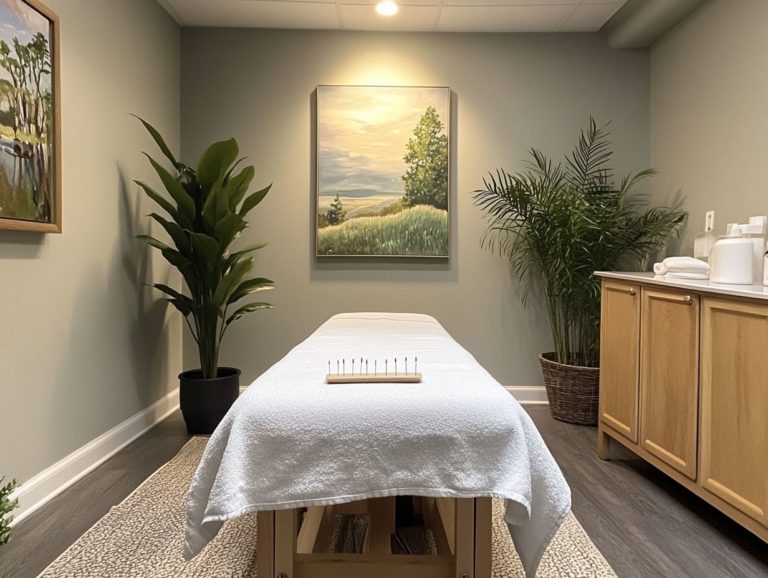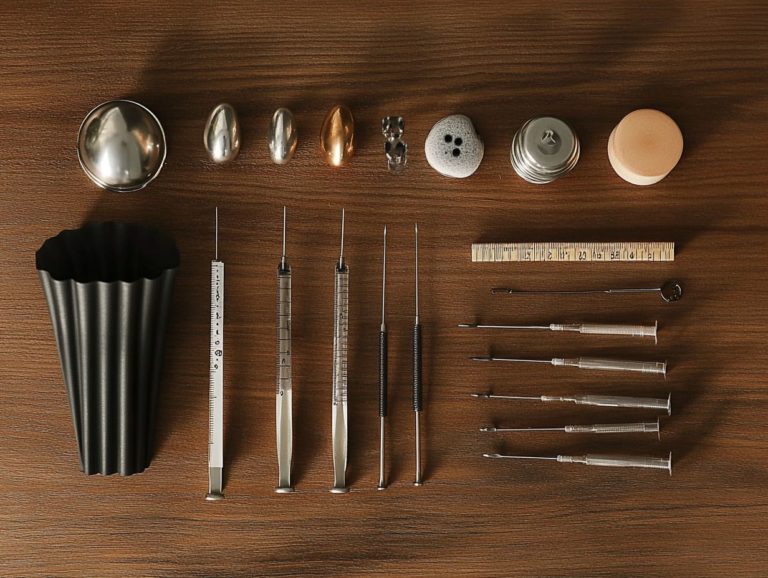Understanding Energetic Healing and Acupuncture
Energetic healing and acupuncture are captivating practices that provide holistic approaches to health and well-being.
Grounded in ancient traditions, these therapies connect with the body s natural energy systems. They foster balance and healing on various levels.
This article explores their rich histories and explains how they operate. We will also highlight the numerous benefits they offer while addressing misconceptions and controversies.
If you re curious about these practices or thinking of incorporating them into your wellness journey, a wealth of knowledge awaits you.
Contents
Key Takeaways:

Energetic healing and acupuncture have ancient roots in traditional practices. For a deeper insight, consider understanding the philosophy behind acupuncture, as these modalities balance the energy flow in the body, promoting physical, mental, and emotional well-being.
Despite some misconceptions, the benefits of energetic healing and acupuncture are widely recognized and supported by research.
What is Energetic Healing?
Energetic healing is a holistic approach that enhances well-being by tapping into a vital energy force. It draws from the rich traditions of Chinese medicine and Ayurveda.
Advocates believe it can rebalance your body s energy field. This can lead to improvements in physical and emotional health, such as reduced pain and elevated mood.
Many individuals report transformative experiences. However, it s crucial to distinguish credible research from pseudoscience when exploring energy healing.
Practitioners use various techniques, including:
- Reiki
- Acupuncture
- Crystal healing
Each method aims to facilitate the flow of healing energy. Together, they seek to restore harmony within your energy system, enhancing mental clarity, emotional resilience, and overall vitality.
A skilled practitioner is invaluable. Their intuition and training help tailor the experience to your unique needs.
As interest in energy healing grows, the scientific community is scrutinizing its effectiveness. Credible research is necessary to validate claims and guide those exploring alternative wellness paths.
What is Acupuncture?
Acupuncture is a time-honored practice in traditional Chinese medicine. Fine needles are inserted into specific points on your body to restore energy balance and promote healing.
This technique addresses various health issues, from pain and anxiety to depression, making it a respected complementary practice.
With origins dating back over 2,500 years, acupuncture has evolved through diverse schools of thought. Practitioners believe stimulating designated ‘energy pathways’ can unlock your innate healing capabilities.
This holistic approach addresses physical discomfort while nurturing your emotional and mental well-being.
Among its health benefits, acupuncture is known for reducing stress and improving sleep quality. When performed precisely, it can significantly enhance your overall health, making it a compelling option for non-invasive therapies.
History and Origins of Energetic Healing and Acupuncture
The history of energetic healing and acupuncture spans thousands of years. These practices are woven into ancient medical traditions such as traditional Chinese medicine and Ayurveda.
Both highlight the importance of energy balance in achieving optimal health. Over the centuries, these modalities have evolved, embracing cultural influences and are celebrated globally for their complementary benefits.
Traditional Practices and Cultural Influences

Traditional practices of energetic healing, like Reiki, qigong, and reflexology, draw upon a rich tapestry of cultural influences, including the principles of Ayurveda and traditional Chinese medicine. This highlights the overall health and well-being.
These practices emphasize the significance of energy balance and the vital role practitioners play in channeling healing energy to address both physical discomfort and emotional hurdles. Rooted in the belief that everything in the universe is interconnected, energetic healing methodologies acknowledge that emotional and physical ailments arise from imbalances in the life force.
In Ayurveda, this connection is represented through doshas, the energies in Ayurveda, while traditional Chinese medicine involves the concept of Qi, the life force. Practitioners trained in these ancient methods often employ a variety of techniques such as acupressure, herbal remedies, and meditation to foster not only recovery but also a deeper harmony within both body and mind.
By integrating these time-honored practices, you re encouraged to cultivate awareness of your inner energy landscape, ultimately guiding you toward a more balanced and fulfilling life.
How Energetic Healing and Acupuncture Work
Energetic healing and acupuncture are rooted in the fundamental principles of energy balance. They employ a range of techniques to restore the harmonious flow of healing energy throughout your body, making it essential to explore understanding energy healing and its benefits.
These practices also seek to rectify imbalances that may lead to physical discomfort, emotional struggles, and affect your overall well-being. They showcase their complementary roles within the field of integrative health.
Principles and Techniques
The principles and techniques of energy healing invite you into a world of various modalities, such as therapeutic touch, Reiki, and qigong. All are designed to restore energy balance within your body.
Acupuncture, a well-known practice involving precise needle placement, directly engages these principles by stimulating specific points to promote healing and alleviate discomfort.
Beyond acupuncture, therapeutic touch enables practitioners to assess and manipulate the energy field surrounding you, facilitating a flow that can significantly reduce stress.
Reiki, another dynamic approach, utilizes gentle hand placements to channel universal life force energy, nurturing a profound state of relaxation and emotional healing.
Qigong enriches this spectrum by blending movement, breath control, and meditation, ultimately enhancing your vitality through the harmonization of your body s energies.
Collectively, these techniques offer a holistic approach to wellness, supporting pain management, emotional balance, and overall vitality. They emphasize the intricate connection between mind, body, and spirit in your journey toward optimal health.
Benefits of Energetic Healing and Acupuncture
The benefits of energetic healing and acupuncture offer a remarkable range of enhancements to your physical, mental, and emotional well-being.
Imagine experiencing pain relief and feeling revitalized! You can also enjoy a boost in mood and a reduction in anxiety, all of which contribute to a significantly improved quality of life.
These practices are gaining recognition for their effectiveness in tackling a variety of health challenges and emotional hurdles, making them invaluable tools for holistic wellness.
If you’re interested in experiencing these benefits for yourself, consider exploring energetic healing and acupuncture further!
Physical, Mental, and Emotional Benefits

Energetic healing and acupuncture present many physical, mental, and emotional benefits that can transform your well-being. You will likely feel reduced pain, improved symptoms of depression, and alleviation of anxiety ultimately enhancing your overall quality of life.
Many individuals report remarkable improvements in their mental health. They find these complementary practices beneficial.
Research backs these claims, including a 2019 study published in the Journal of Alternative and Complementary Medicine, which indicated that acupuncture can be particularly effective in managing chronic pain and boosting emotional resilience. Participants noted lower anxiety levels. They credited their progress to regular treatment sessions.
These practices help your body heal and also support your emotional health and you deserve that!
The integration of these modalities cultivates emotional stability, enabling you on your path toward holistic health.
Common Misconceptions and Controversies
Common misconceptions and controversies surrounding energy healing and acupuncture often arise from a lack of understanding, which can lead to claims of pseudoscience and skepticism about their effectiveness.
While some critics may argue that these practices lack clinical significance, credible research is emerging to support their benefits and advocate for a more nuanced perspective.
Embracing this balanced view allows for a deeper appreciation of these healing modalities.
Addressing Myths and Misunderstandings
Addressing the myths and misunderstandings surrounding energy healing and acupuncture is essential for fostering informed discussions about these practices. You might assume that these modalities lack scientific backing, but credible research reveals their potential benefits in promoting health and well-being.
Debunking these misconceptions requires a thorough examination of existing studies that highlight their effectiveness in managing various conditions such as chronic pain, anxiety, and even insomnia.
For instance, a review published in the Journal of Pain Research analyzed numerous clinical trials and discovered that acupuncture significantly alleviates pain in patients, directly contradicting the notion that these treatments are merely placebos.
Energy healing practices, often dismissed as pseudoscience, have also demonstrated their ability to influence physiological processes and enhance emotional health. This aligns with findings from psychology and neuroscience that underscore the powerful mind-body connection.
Frequently Asked Questions
What is energetic healing?

Energetic healing is a form of alternative medicine that focuses on the body’s energy systems, with the belief that imbalances or blockages in these systems can lead to physical, mental, and emotional illnesses. It involves various techniques, such as acupuncture, Reiki, and chakra balancing, to restore the flow of energy and promote healing.
What is acupuncture?
Acupuncture is a traditional Chinese medicine practice that involves the insertion of thin needles into specific points on the body, known as acupuncture points. It is believed to stimulate the flow of energy, known as Qi (pronounced ‘chee’), and promote healing and balance within the body.
How does energetic healing and acupuncture work?
Energetic healing and acupuncture work by targeting the body’s energy systems and restoring balance and flow. The specific techniques used, such as inserting needles or using hands-on healing, aim to move energy to areas of the body that are not feeling well. For more insights, refer to understanding energy healing principles and practices.
What are the benefits of energetic healing and acupuncture?
Some potential benefits of energetic healing and acupuncture include pain relief, stress reduction, improved energy and vitality, and better overall physical, mental, and emotional well-being. It can also be used to treat specific health conditions, such as migraines, digestive issues, and anxiety.
Is energetic healing and acupuncture safe?
Yes, energetic healing and acupuncture are safe when performed by a qualified specialist. The needles used in acupuncture are sterile and for single use, while hands-on healing techniques are non-invasive.
It’s important to discuss any health issues with your specialist before starting treatment.
How many sessions of energetic healing and acupuncture are needed?
The number of sessions varies for each person and depends on specific health concerns. Many people feel better after just one session!
Your specialist will help create a personalized plan to suit your unique needs.






